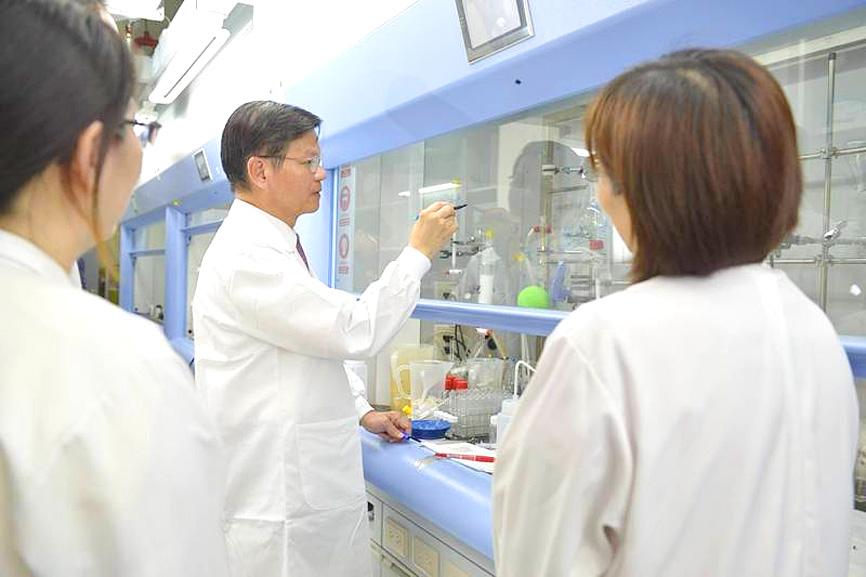Initial assessments show that existing COVID-19 vaccines are likely to provide a considerable degree of protection against the Omicron variant of SARS-CoV-2, former Academia Sinica president Wong Chi-huey (翁啟惠) said on Monday.
Although most Omicron cases are mild, the variant still needs to be watched closely, said Wong, who is also president of the Institute of Biotechnology and Medicine Industry (IBIM).
Describing the appearance of the new variant as “worrisome,” he said that more time is needed to understand whether Omicron is more transmissible compared with other variants.

Photo courtesy of Wong Chi-huey
There are a small number of severe COVID-19 cases, but it is still not known whether people who had mild symptoms were helped by having been vaccinated, Wong said.
There are some early signs that COVID-19 vaccines might be effective against Omicron and the extent of the threat posed by Omicron might not be as great as people had thought, he said.
Nearly two years after the first COVID-19 cases were recorded, a large number of variants of SARS-CoV-2 — the virus that causes COVID-19 — have been detected, with five gaining the most attention: the Alpha, Beta, Gamma, Delta and Omicron variants, he said.
Currently, 90 percent of more than 265 million COVID-19 cases reported worldwide are attributed to the Delta variant.
Academia Sinica’s Genomics Research Center has developed a messenger RNA (mRNA) vaccine that has proven in animal trials to provide protection against various variants and might also be effective against the Omicron variant, Wong said, adding that the center is applying for patents for its vaccine and is entering technology transfer negotiations.
The WHO has approved at least six COVID-19 vaccines for use and about 300 new vaccines are in development, Wong said, adding that about 50 percent of the world’s population has so far received at least one dose of a COVID-19 vaccine.
However, less than 5 percent of the population in Africa has received one dose of a vaccine, and if vaccination rates continue to remain low on the continent, it could prove dangerous, he said.
Although COVID-19 breakthrough infections are on the rise, vaccination can prevent or reduce the severity of the disease, and is still the best tool to curb the COVID-19 pandemic, Wong added.

POSITIVE DEVELOPMENT: Japan and the US are expected to hold in-depth discussions on Taiwan-related issues during the meeting next month, Japanese sources said The holding of a Japan-US leaders’ meeting ahead of US President Donald Trump’s visit to China is positive news for Taiwan, former Japan-Taiwan Exchange Association representative Hiroyasu Izumi said yesterday. After the Liberal Democratic Party’s landslide victory in Japan’s House of Representatives election, Japanese Prime Minister Sanae Takaichi is scheduled to visit the US next month, where she is to meet with Trump ahead of the US president’s planned visit to China from March 31 to April 2 for a meeting with Chinese President Xi Jinping (習近平). Japan and the US are expected to hold in-depth discussions on Taiwan-related issues during the

‘LIKE-MINDED PARTNER’: Tako van Popta said it would be inappropriate to delay signing the deal with Taiwan because of China, adding he would promote the issue Canadian senators have stressed Taiwan’s importance for international trade and expressed enthusiasm for ensuring the Taiwan-Canada trade cooperation framework agreement is implemented this year. Representative to Canada Harry Tseng (曾厚仁) in an interview with the Central News Agency (CNA) said he was increasingly uneasy about Ottawa’s delays in signing the agreement, especially as Ottawa has warmed toward Beijing. There are “no negotiations left. Not only [is it] initialed, we have three versions of the text ready: English, French and Mandarin,” Tseng said. “That tells you how close we are to the final signature.” Tseng said that he hoped Canadian Prime Minister Mark Carney

Taiwan has received more than US$70 million in royalties as of the end of last year from developing the F-16V jet as countries worldwide purchase or upgrade to this popular model, government and military officials said on Saturday. Taiwan funded the development of the F-16V jet and ended up the sole investor as other countries withdrew from the program. Now the F-16V is increasingly popular and countries must pay Taiwan a percentage in royalties when they purchase new F-16V aircraft or upgrade older F-16 models. The next five years are expected to be the peak for these royalties, with Taiwan potentially earning

President William Lai (賴清德) yesterday bestowed one of Taiwan’s highest honors on Saint Vincent and the Grenadines (SVG) Ambassador Andrea Clare Bowman in recognition of her contributions to bilateral ties. “By conferring the Order of Brilliant Star with Grand Cordon on Ambassador Bowman today, I want to sincerely thank her, on behalf of the Taiwanese people, for her outstanding contribution to deepening diplomatic ties between Taiwan and SVG,” Lai said at a ceremony held at the Presidential Office in Taipei. He noted that Bowman became SVG’s first ambassador to Taiwan in 2019 and